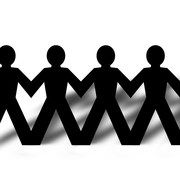The University of Washington notes that the average human brain weighs about 3 lbs, or 1,400 grams. Each part of the brain controls essential functions that we rely on daily. The human brain is divided into two halves, which are connected by the corpus callosum: the left hemisphere and the right hemisphere. Both the left and right hemispheres have specialized functions. For example, the University of Washington explains that the left hemisphere controls logic, language and mathematics. Functions related to the right hemisphere include music, facial recognition, visual imagery and spatial abilities.
Each of the hemispheres has four lobes: the frontal lobe, the parietal lobe, the temporal lobe and the occipital lobe. The frontal lobe, which is the brain lobe at the front of the brain, controls many functions, such as parts of speech and movement. Other frontal lobe functions include problem solving, reasoning, emotions and planning. The parietal lobe, which is behind the frontal lobe and towards the top of the head, processes sensory information, such as pain, touch, temperature and pressure. Below the parietal lobe is the temporal lobe, which is involved in hearing and memory. The fourth lobe, the occipital lobe, which is at the back of the brain, controls some vision processes. Below the occipital lobe is the cerebellum, which is responsible for coordination, balance and posture.
A new study conducted at the University of Minnesota, which is published in Psychological Science, points out that the size of different brain parts may be connected to personality. The authors of the study looked at five areas of the personality: extroversion, agreeableness, conscientiousness, neuroticism and openness/intellect. The study used 116 people who filled out personality questionnaires and underwent brain scans.
Using a computer program, the authors looked for differences in brain size in people of different personality types. For example, HealthDay News reports that people who described themselves as extroverts had a larger medial orbitofrontal cortex (within the frontal lobes), a part of the brain linked to the reward system. People who described themselves as conscientious had a larger prefrontal cortex (the front-most part of the frontal lobes), a part of the brain linked to planning and controlling behavior. The authors also found differences in brain size for neuroticism and agreeableness, but not for openness/intellect.
This new study provides interesting insight into how differences in the brain can relate to behavior and personality difference. However, HealthDay News points out that the authors note that “personality is not an immutable force, given that the brain grows and changes in reaction to experience.” As a result, if changes occur to the brain, such as to the frontal lobe, they can also cause changes to a person's personality.






Add a CommentComments
There are no comments yet. Be the first one and get the conversation started!